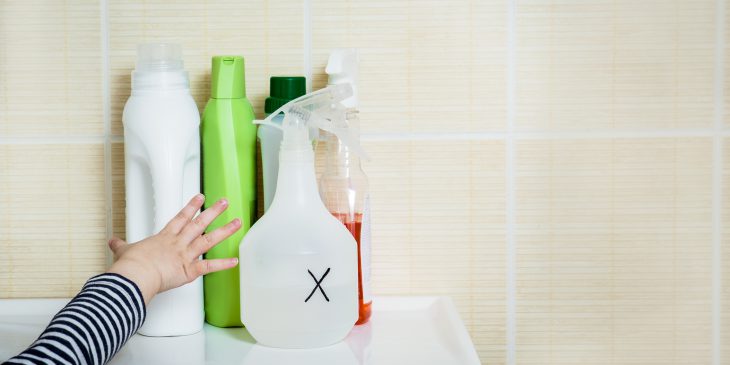Questions about various home remedies and ways to prevent COVID-19 have been circulating on social media and in the news since the onset of the coronavirus pandemic; theories such as gargling hot saltwater, drinking mass quantities of water and taking various vitamins or antibiotics represent a few.
While there may be some “rationality” behind these theorized ideas, Michael Lynch, M.D., medical director of the Pittsburgh Poison Center at UPMC emphasized the dangers of self-medicating and using home remedies to ward off the virus.
“Be careful what you read on social media, there is all sorts of inaccurate information out there,” said Lynch. “The best thing people can do is maintain their general health, eat a healthy diet and get exercise when they can. Practice social distancing, use good hand hygiene and stay home unless you need to go out for essential activities.”
One of the most dangerous prevention methods circulating online is the uncontrolled use of chloroquine or hydroxychloroquine to thwart COVID-19. Researchers are working to determine if these drugs can slow the virus and the assist the body’s inflammatory response to it. However, this has yet to be proven and according to Lynch, these drugs can have serious side effects. In fact, emerging data suggest that use of hydroxychloroquine may increase the risk of death without significant beneficial impact on the treatment of COVID-19. Usage without medical supervision can result in body toxicity within 30-60 minutes— causing sedation, coma, seizures, abnormal heart rhythms and cardiac arrest as they can block the way electricity is conducted in the heart.
“Don’t take chloroquine outside of a physician’s recommendation,” advised Lynch. “At this moment the best we can say about the medication is that it has been hypothesized that it can be helpful. People with lupus or other conditions can safely take this when prescribed, but we need a better understanding of the risks and benefits of taking this to treat COVID-19.”
Lynch also noted the increased level of danger for children when dealing with chloroquine stating that “one pill can kill.”
Additional concerns for child safety have been generated by the coronavirus and substances less precarious than chloroquine. As everyone tries their best to maintain proper hand hygiene with hand sanitizer, and a clean home environment with bleach, the Pittsburgh Poison Center at UPMC has seen an increase in calls related to accidental exposure involving children.
Since the beginning of March, Pennsylvania poison control centers have recorded 290 exposures related to hand sanitizer — an 58% increase compared to last year. Of these exposures, 74% — involved children 12 and under—more than half involved children under five.
“We know these are at least 60% alcohol, and are out and accessible to most people, but kids can get into them, getting it in their eyes or ingesting them,” explained Lynch. “Kids can get alcohol intoxication from these and become sick. It’s a widely accessible product that is important to have around, but we want to make sure kids can’t access them if they don’t understand how it’s supposed to be used.”
There have been 361 exposures to bleach reported since March 1, marking an 89% increase from last year with nearly one-third of the cases involving children younger than five.
“We are all appropriately trying to maintain our environments to be as clean as possible, but we know that these chemicals can cause skin irritation or vomiting if ingested. Most cases we are seeing are in kids— getting it on the skin or in the eyes,” said Lynch. “As kids are home more often now, and these things are out and more available, exposure is at a higher risk. We need to be conscious of where we are storing things.”
Another potential risk to individuals trying to disinfect their homes and maintain cleanliness comes from mixing cleaning agents, especially bleach with either acid-based or ammonia-based cleaners. Mixing these chemicals can result in the production of chlorine and chloramine gas, respectively. Chlorine gas has been used as a chemical warfare agent, and both gases can cause mouth, throat nose, and eye burning and irritation as well as cough, lung irritation and injury. Pa. poison centers have managed 96 exposures to one or both of these gases since March 1, a 66% increase compared to the same time period last year, according to Lynch.
“In addition to avoiding accidental exposures to cleaning supplies, it is critical that people understand that intentionally administering cleaners or disinfectants, whether intravenously, by mouth, or inhalation, is incredibly dangerous. The reason these agents work to kill viruses and bacteria is that they are caustic to all living cells and organisms. They would not differentiate healthy human cells from viruses in the body and the overall effect would be incredible injury and damage to someone who tries to treat or prevent disease in this way,” explained Lynch.
Similarly, ultraviolet (UV) light appears to be a very effective decontamination method for surfaces and objects, however, excessive human exposure to UV light waves can result in skin and mucous membrane irritation, burns, blistering and increase long-term risk of cancer, without an anticipated positive impact on treating the virus— which has already entered the cells of the body.
One final danger to avoid is ingesting household objects for the purpose of intoxication. Since March 1, PA poison centers have received reports of 113 exposures to rubbing alcohol representing a 223% increase from the same time period last year— the majority of exposures occurring in adults.
“We know liquor stores are closed, and people are advised to stay home,” said Lynch. “People will sometimes drink mouthwash or rubbing alcohol—it’s very abrasive to the stomach and can cause vomiting and abdominal bleeding. It can lead to inflammation of the stomach and pancreas, causing vomiting of blood. Additionally, ingestion of other household and automotive liquids such as antifreeze or windshield washer fluid can result in life-threatening toxicity.”
Anyone with questions or concerns about a potential poison exposure should contact the Pittsburgh Poison Center at UPMC at 1-800-222-1222. Experts are available 24-hours to answer questions—including those about hypothesized COVID-19 prevention methods.
For further information on COVID-19, visit www.upmc.com/coronavirus.









